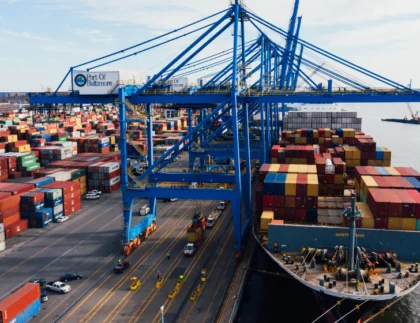
Freight fraud has become an increasing concern for logistics, transportation, and global trade businesses as supply chains grow more complex and fraudulent activities targeting logistics operations evolve. This can lead to significant financial losses and reputational damage.
Companies must prioritize freight fraud prevention through robust security measures, advanced validation technology, and compliance-driven anti-fraud solutions. By integrating secure transactions and logistics security strategies, businesses can fortify their operations against fraudulent disruptions and enhance overall supply chain protection.
Understanding the Growing Threat of Freight Fraud
The logistics industry operates on trust and efficiency, making it an attractive target for fraudsters. Freight fraud comes in many forms, including identity theft, fake carrier schemes, fraudulent pickups, and cyber-related threats. Fraudsters manipulate vulnerabilities in logistics networks to divert shipments, falsify documents, and deceive stakeholders into unauthorized financial transactions.
The economic impact of these fraudulent activities extends beyond lost cargo; it disrupts supply chains, damages relationships, and results in costly legal disputes. As freight fraud tactics evolve, logistics companies must remain vigilant and employ robust freight fraud detection mechanisms to mitigate risks effectively.

Implementing Secure Freight Logistics Practices
Strengthening security measures within logistics operations is essential to prevent fraud. Companies should conduct thorough background checks on carriers, brokers, and vendors before engaging in transactions. Verifying credentials, licenses, and insurance documents helps identify legitimate service providers and eliminates the risk of working with fraudulent entities. Secure freight logistics also require advanced tracking and monitoring systems to ensure real-time visibility of shipments.
GPS-enabled tracking and blockchain-based documentation enhance transparency, making it difficult for fraudsters to manipulate freight movements or falsify delivery records. Moreover, implementing stringent authentication protocols for driver and carrier verification adds an extra layer of protection. Biometric authentication, digital signatures, and secure QR code scanning can significantly reduce unauthorized shipment access, preventing fraudulent pickups and identity theft within the logistics sector.
Enhancing Logistics Compliance for Fraud Prevention
Maintaining regulatory compliance is essential to stopping fraud in the freight and logistics sector. By following trade laws, industry standards, and security procedures, companies can operate inside legally established frameworks and lessen their vulnerability to fraudulent schemes. Companies that want to comply with logistics requirements must keep correct records, carry out regular audits, and put best practices for safe transactions into place. Companies run the danger of facing fines and financial repercussions for noncompliance with regulations, making fraud more likely.
Businesses should integrate compliance-driven anti-fraud systems that enable real-time validation and verification of shipments, invoices, and carrier credentials. Thanks to automated compliance management solutions that can identify inconsistencies in freight transactions, only authorized parties handle goods and payments. A proactive approach to compliance deters dishonest actors from breaking into logistics networks and promotes an accountable culture.

Leveraging Validation Technology for Supply Chain Protection
Modern validation technology revolutionizes the fight against freight fraud by providing secure methods to authenticate logistics transactions. AI-powered fraud-resistant logistics platforms analyze patterns in freight movements, detect anomalies, and flag suspicious activities before they escalate. Machine learning algorithms can identify irregularities in shipment data, preventing fraudsters from exploiting loopholes in logistics systems.
Blockchain technology offers another layer of protection by enabling tamper-proof record-keeping of freight transactions. Smart contracts automate payment processes and verify contract fulfillment, ensuring that payments are only released upon successful delivery confirmation. This minimizes the risk of invoice fraud and unauthorized financial transactions. Additionally, digital identity verification tools help authenticate carriers and shippers, making it harder for fraudsters to impersonate legitimate logistics providers.
Strengthening Anti-Fraud Solutions in Logistics Security
Businesses must adopt a multi-layered approach to security to establish fraud-resistant logistics. Implementing AI-driven fraud detection systems, leveraging real-time tracking solutions, and integrating blockchain validation can create a robust defence against fraudulent activities. Collaboration between industry stakeholders, including freight forwarders, carriers, insurance providers, and regulatory bodies, further strengthens logistics security measures.
Fraud awareness training is another essential component of a comprehensive anti-fraud strategy. Educating employees, drivers, and supply chain partners about emerging fraud tactics empowers them to recognize and report suspicious activities. By fostering a culture of vigilance, businesses can deter fraud attempts and reinforce supply chain protection.
Ensuring Secure Transactions in Logistics Operations
Financial fraud is a significant concern in freight logistics, as cybercriminals often target payment systems to manipulate transactions. Businesses must prioritize secure transactions by implementing encrypted payment gateways, multi-factor authentication, and safe banking protocols. Digital payment platforms with fraud detection capabilities can identify unauthorized access and prevent fraudulent financial activities.
Moreover, companies should establish stringent invoice validation processes to combat fake billing schemes. Cross-verifying invoices against shipment records, using automated payment reconciliation tools, and enforcing strict approval workflows minimize the risk of financial fraud within logistics operations. Secure transactions protect businesses from financial losses and build trust among clients and stakeholders, ensuring smooth and transparent freight dealings.

Conclusion
As technology evolves, so will the methods fraudsters use to exploit vulnerabilities in logistics networks.
Businesses must stay ahead of fraudulent activities by investing in advanced security solutions, reinforcing logistics compliance, and leveraging data-driven insights for fraud detection. The future of freight fraud prevention lies in the seamless integration of AI, blockchain, and digital validation technologies to create an ecosystem where fraud-resistant logistics thrive.
Companies can enhance logistics security, ensure secure freight transactions, and protect their supply chains from fraudulent threats by adopting proactive fraud prevention measures. In an industry where efficiency and reliability are paramount, securing logistics operations against fraud is not just an option but a necessity for long-term sustainability and success.











